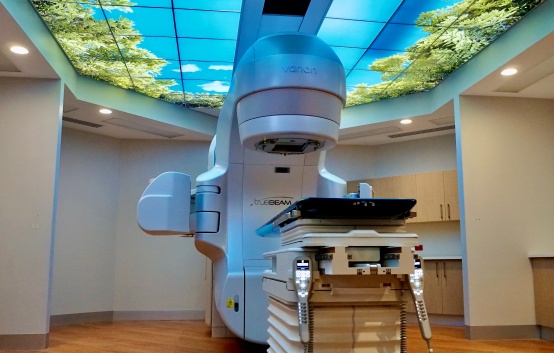
- Details
- Written by: Naomi Harrison
- Category: News
- Hits: 74
Patients in Melbourne’s west can access the very latest in “tattoo-less” radiotherapy, and more complex cases can be treated closer to home, thanks to major upgrades at the Sunshine Hospital Radiation Therapy Centre.

The centre is operated by Peter Mac in collaboration with Western Health – with an agreement now signed to extend the partnership to 2031.
The latest body-tracking technology has been installed, with the first patient being treated with the new AlignRT system this month, while two upgraded treatment machines mean more complex cases are no longer diverted to Peter Mac’s main centre in the CBD.
Peter Mac Chief Executive Professor Shelley Dolan said: “We are delighted to extend our partnership with Western Health which, for over a decade now, has ensured patients in Melbourne’s west have access to publicly funded and research-led radiotherapy services close to home”.
Western Health Chief Executive Adjunct Professor Russell Harrison said: “We know that receiving treatment for cancer can be a very stressful time for patients. So being able to provide radiotherapy close to home has been a real benefit for our patients.”
The Sunshine Hospital Radiation Therapy Centre delivers radiotherapy courses to more than 800 patients every year. It is staffed by both Peter Mac and Western Health employees and includes highly skilled radiation oncologists, radiation therapists, medical physicists, radiation engineers, specialist cancer nurses, allied health and administration staff. Medical oncology and palliative care doctors are also onsite.
Two newly installed Varian TrueBeam radiation therapy machines have enabled the centre to perform stereotactic radiosurgery - a highly precise form of radiotherapy used to treat tumours in the brain, neck, lungs, liver, spine and other parts of the body.
The new AlignRT technology tracks body position in real time to correctly position patients for treatment, doing away with the need for tiny, permanent “X” tattoos marked on the patient’s skin. This upgrade was made possible through the generosity of a number of donors to the Peter MacCallum Cancer Foundation.
“Peter Mac and Western Health are committed to delivering an outstanding radiotherapy service to patients in Melbourne’s west,” says Dr Dishan Herath, who is a medical oncologist at Western Health and Peter Mac and Director of Cancer Services at Western Health.
“The technology upgrades and new treatment machines, which enable this centre to treat more complex cases, are the latest examples of delivering on this now long-standing commitment.”
Contacts:
For more information contact the Peter Mac Communications team on 0417 123 048.
About Peter Mac
Peter MacCallum Cancer Centre is a world-leading cancer research, education and treatment centre and Australia’s only public health service solely dedicated to caring for people affected by cancer.
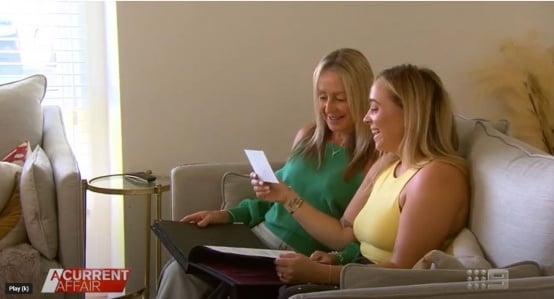
- Details
- Written by: Naomi Harrison
- Category: News
- Hits: 127
Fan favourite from "The Block" reality TV show, Sarah-Jane has spoken publicly about her family's history of cancer and her decision to have preventive double mastectomy.

The surgery took place at Peter Mac late last year.
Her story aired last night on Nine's "A Current Affair" and also included interviews with Professor Paul James - a Clinical Geneticist and Director of the Parkville Familial Cancer Centre - and Sarah-Jane's surgeons Dr Holly Keane and Dr Angela Webb, Head of Peter Mac's Plastic and Reconstructive Surgery Unit.
Watch the story here:
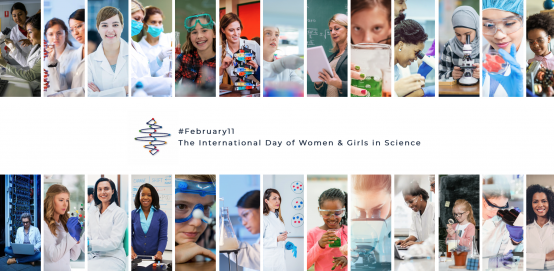
- Details
- Written by: Naomi Harrison
- Category: News
- Hits: 109
Today on International Day of Women and Girls in Science, we’re featuring some of the incredible women working in research at Peter Mac.

It's an important day to highlight the immense contribution women are making in STEMM (science, technology, engineering, maths and medicine) – and to inspire the next generation to think about careers in these exciting and rewarding fields.
A significant gender gap has persisted throughout the years in STEMM disciplines all over the world.
Even though women have made tremendous progress towards increasing their participation in higher education, they are still under-represented in these fields.
“ We can all do our part to unleash our world’s enormous untapped talent – starting with filling classrooms, laboratories, and boardrooms with women scientists”.
- UN Secretary-General António Guterres
Find out more about some of the women working in science at Peter Mac below.
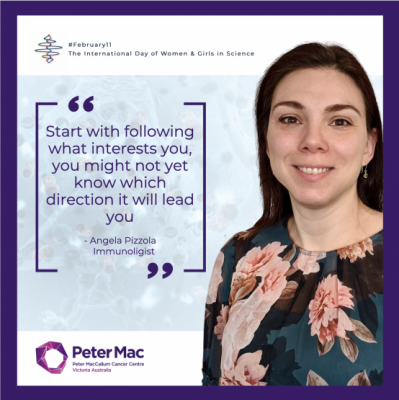
Angela Pizzola - Immunologist
Tell us about your role at Peter Mac?
I’m an immunologist; a researcher who studies the immune system, how it works and how it can be improved to protect us more effectively from infections and cancer. Our immune system is constantly at work to remove cells that are not right and when cancer prevails, it’s because it silences the immune system or has made itself invisible to it.
In the last decade, new treatments that stimulate the immune system have proven very effective against several cancers and they provide the basis to continue to improve and refine these treatments.
What was your path into your science career, what subjects did you study at high school and university?
I studied biotechnology at university because it was a very new subject with widespread applications to all aspects of life - from new foods to fuels to medical treatments. I fell in love with immunology because the immune system is a fascinatingly complex subject, always in flux, always changing and crucial to a healthy life.
What is your advice to women and girls who are considering a career in science?
My advice is to start with following what interests you - you might not yet know which direction it will lead you. There are so many careers that can be pursued in science that leverage on many interests and skills, from illustrator to scientific writer to lab scientist to clinician (and many more). The opportunities will appear once you start learning new skills and exploring fields of interest.
What’s your message on International Day of Women and Girls in Science?
Working in science is challenging and rewarding and if you find yourself in a positive and supporting environment, it’s a lot of fun. I have worked in six different institutes across 3 countries and found that women occupy at least 50 per cent or more of the work force but there are sadly still less than 50 per cent in leadership positions. Slowly this is changing and I’m optimistic that it will keep improving.
The best working environments are the ones where both women and men work side by side in a collaborative manner and science can provide such opportunity.
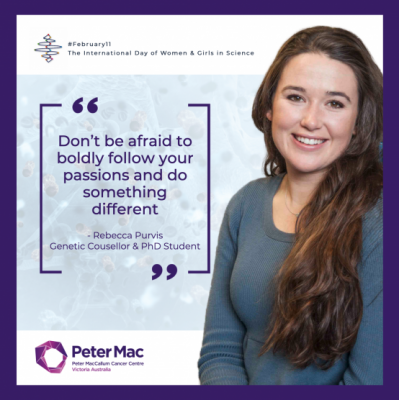
Rebecca Purvis – genetic counsellor and PhD student
Tell us about your role at Peter Mac?
I am a certified clinical and academic genetic counsellor currently working and completing my PhD within the Parkville Familial Cancer Centre.
What was your path into your science career, what subjects did you study at high school/course at university?
I was always really interested in medical genetics and the bioethical challenges that new technologies herald. At university, I completed an undergraduate Bachelor of Science majoring in genetics and went on to complete a Postgraduate Diploma in Health Sciences, majoring in bioethics and medical anthropology. I was fortunate enough to be awarded a Fulbright Scholarship to then complete my Master of Genetic Counselling in the United States.
What is your advice to women/girls who are considering a career in science?
Don’t be afraid to boldly follow your passions and do something different.
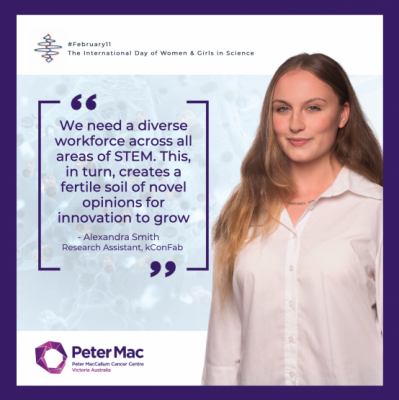
Alexandra Smith – Research Assistant kConFab
Tell us about your role at Peter Mac?
I work as a Research Assistant with a group called kConFab, an ongoing cohort study in operation for the past 25 years. Our group looks at the genes underlying breast, ovarian and prostate cancer with a focus on gene discovery and translational work.
What was your path into your science career, what subjects did you study at high school and university?
In high school, I took mostly mathematics and science subjects. My favourite subject was chemistry because I enjoyed the problem solving aspect of it. After school, I completed a Bachelor of Science with Honours at the University of Melbourne. I took mostly anatomy and neuroscience subjects. The scientific methods that I learnt and the scientific way of thinking that I developed when completing my degree are very beneficial to the work I now do in my current role in cancer research. Many scientific skills are transferrable, you just need to practice some lateral thinking
What is your advice to women/girls who are considering a career in science?
In general, it has been found that women tend to not apply for jobs unless they fit all the selection criteria whilst men will apply for jobs when they fit only just over half of the selection criteria. Therefore, my advice to women and girls who are considering entering science is to not be discouraged. You do possess the skills and are as worthy as your male peers to be in science. There are initiatives and programs that already exist to help support women to be in STEM, in particular in male dominated fields such as engineering. Women and girls should research and source these opportunities independently, not because they need them to succeed, but as a form of self-empowerment.
What’s your message/what would you like people to know on International Day of Women and Girls in Science?
Science is an ever changing, dynamic field where what is thought to be true is constantly being questioned. To prevent biases, we need a diverse workforce across all areas of STEM. This, in turn, creates a fertile soil of novel opinions for innovation to grow, whilst also supporting equity in the workforce.
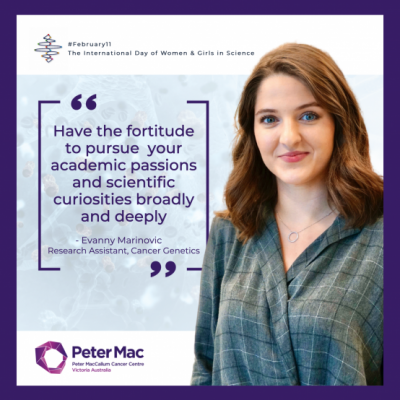
Evanny Marinovic - Research Assistant, Cancer Genetics Lab
Tell us about your role at Peter Mac?
I mostly perform ‘wet lab’ experiments, which means that I get to be hands-on and have fun producing data with very fancy technologies and robots, all to prove or disprove intriguing hypotheses. I also optimise experiments, trying to figure out why some things in the lab might not be working well or, sometimes, at all! I feel very blessed that I get to research hereditary breast cancer, which is the reason my late grandmother was a patient at Peter Mac many years ago.
What was your path into your science career, what subjects did you study at high school and university?
I went to a regional public high school and did a Bachelor of Science at University of Melbourne and a Master of Biomed Science at Monash, majoring in oncology. My Master’s project was at Peter Mac and focussed on surface protein expression in rare ovarian cancer cells, and how drugs can exploit them. This is where I ‘fell for’ cancer biology and scientific research. During my undergrad at University of Melbourne, I also completed a Diploma in French as I have a huge passion for linguistics (English or otherwise) and didn’t want/need to sacrifice other goals at a cost of my love for science.
What is your advice to women/girls who are considering a career in science?
I would advise girls to have the fortitude to pursue their academic passions and scientific curiosities broadly and deeply. The pathways that sometimes seem too nerdy and/or difficult to be accessible are often the most enjoyable and rewarding ones! You don’t have to be a hyper-intelligent workaholic to be successful in science, just dedicated and enthusiastic.
What’s your message/what would you like people to know on International Day of Women and Girls in Science?
I would like people to know how much patience and appreciation for the dynamic journey towards your desired career path will help make you more complete and successful in the end, rather than hurriedly focusing on any final destination. And that not all scientists are as dorky as they are sometimes portrayed.
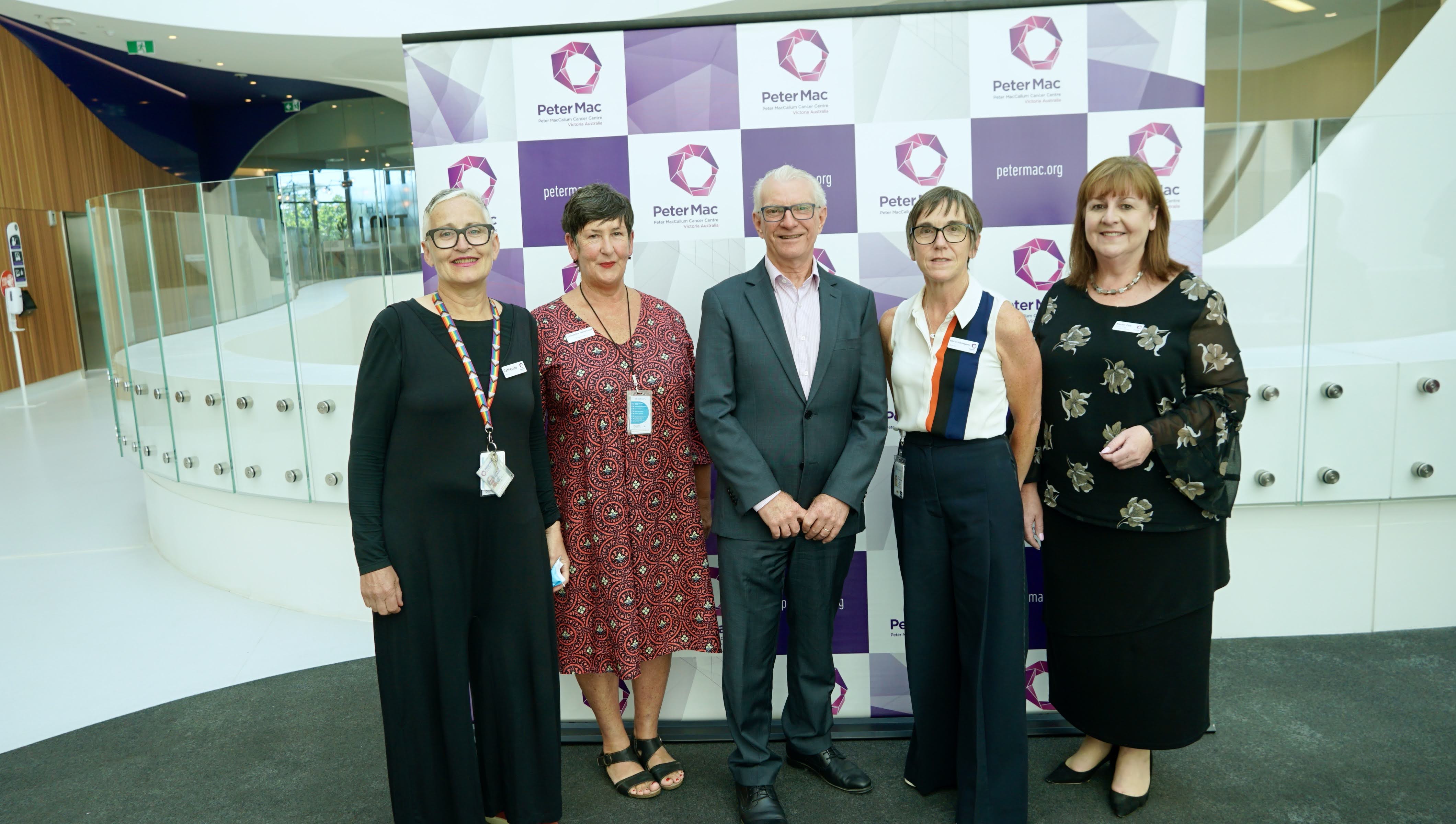
- Details
- Written by: Naomi Harrison
- Category: News
- Hits: 257
Peter Mac’s Academic Nursing Unit has led a ground-breaking study into elder abuse to inform a suite of brand-new resources for healthcare professionals.

The resources, codesigned with consumers and Peter Mac Staff, will be used to train staff to identify when a patient may be suffering elder abuse – and how to have a sensitive conversation to offer support and access to services.
“Many doctors and nurses described intuitively sensing something was wrong, but they described a lack of knowledge and confidence to intervene,” Principal Investigator Professor Mei Krishnasamy says.
“These new resources deliver scenarios based on real-life examples so our staff they can see first-hand how to broach the subject and offer confidential support to the patient.”
The scripts for the videos were co-written with Peter Mac staff – and you’ll see a few familiar faces with Senior Nurse Amruta Nandi and Dr Brian Kelly appearing.
The videos cover financial and emotional abuse plus there’s an informative explainer on elder abuse voiced by Consumer Advisor Peter Gourlay which will appear on Peter Mac’s Cancer School.
The resources will be rolled out over the coming months in professional development sessions, with plans to share with other health services in the future.
Peter Mac would like to thank the entire team on their hard work in bringing these resources to life – and to the 19 patient/carer and 18 health professional participants of the REASON study who informed them.
Project Team
Principal Investigator - Prof Mei Krishnasamy
Project Officers – Catherine McMutrie and Catherine Devereux
Consumer advisor - Peter Gourlay
Project team members – Geri MacDonald, Catherine Ludbrook, Kirsty Sams, Jackie D’Abaco and from the University of Melbourne, Professor Lynette Joubert.
Watch the launch below with keynote address from Commissioner for Senior Victorians Gerard Mansour
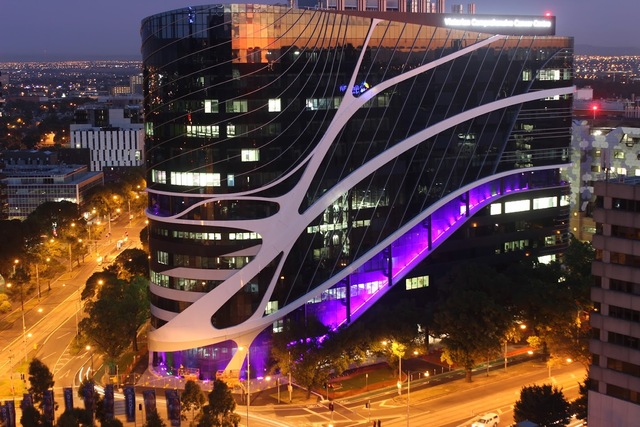
- Details
- Written by: Nadia Joulian
- Category: News
- Hits: 161

Peter MacCallum Cancer Centre can confirm that patient Kate Keltie was diagnosed with stage 4 metastatic breast cancer in October 2022.
“Kate developed breast cancer, which spread to other parts of her body including her hip bone and lymph nodes,” Peter Mac’s Chief Medical Officer, Dr David Speakman, said.
“Kate has had a fantastic response to her treatment and currently has no metabolically active disease.
“However, she will require ongoing treatment and monitoring to check for any return of her cancer,” he said.
Peter Mac supports Kate in her desire for privacy and will not be making further comment about her care at this time.
